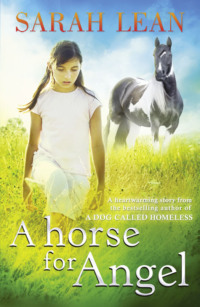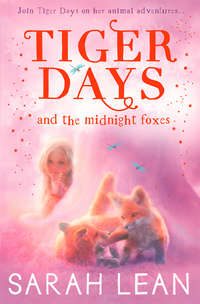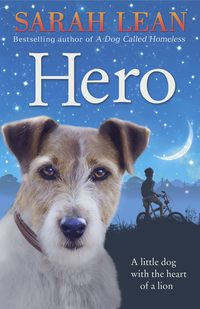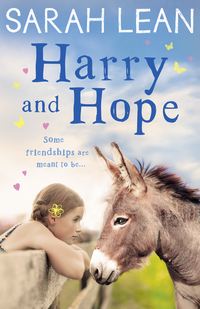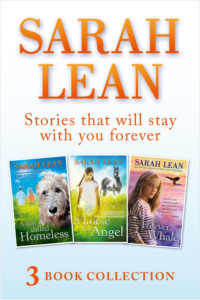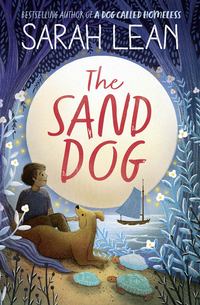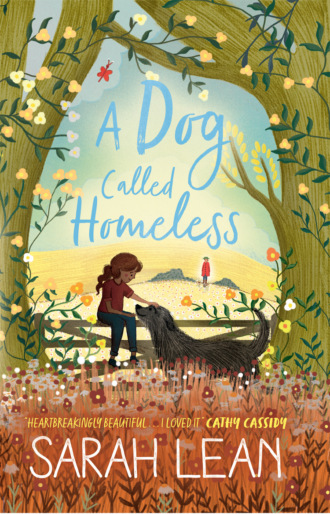
Полная версия
A Dog Called Homeless

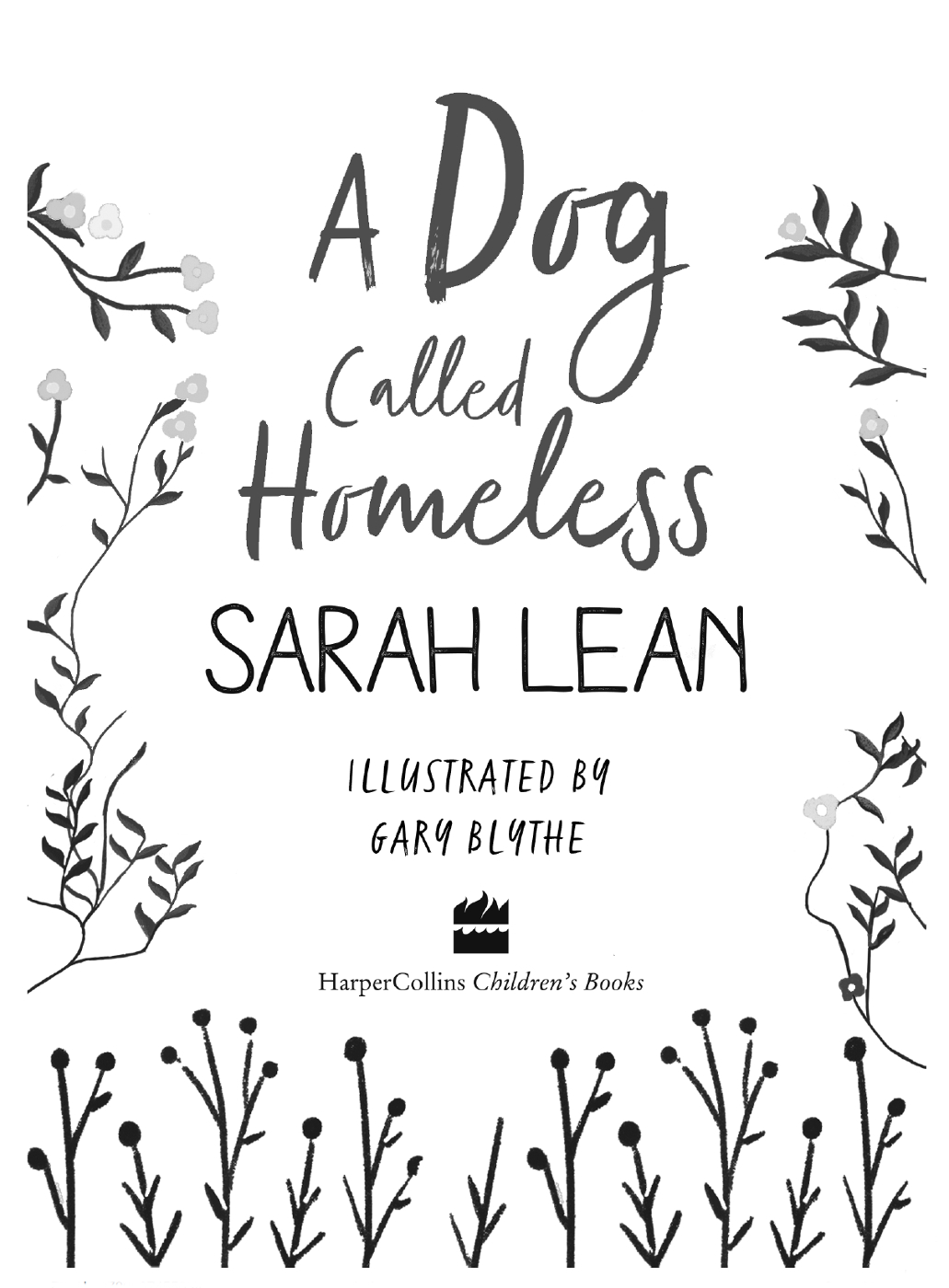
First published in Great Britain by HarperCollins Children’s Books in 2012
Published in this ebook edition in 2018
HarperCollins Children’s Books is a division of HarperCollinsPublishers Ltd,
HarperCollins Publishers
1 London Bridge Street
London SE1 9GF
The HarperCollins Children’s Books website address is
www.harpercollins.co.uk
Text copyright © Sarah Lean 2012
Illustrations copyright © Gary Blythe 2012
Cover design copyright © HarperCollins Children’s Books 2018
Cover design by Katie Everson
Cover illustrations copyright © Jessica Courtney-Tickle
Sarah Lean and Gary Blythe assert the moral right to be identified as the author and illustrator of this work.
A catalogue record for this book is available from the British Library.
All rights reserved under International and Pan-American Copyright Conventions. By payment of the required fees, you have been granted the non-exclusive, non-transferable right to access and read the text of this ebook onscreen. No part of this text may be reproduced, transmitted, downloaded, decompiled, reverse engineered, or stored in or introduced into any information storage and retrieval system, in any form or by any means, whether electronic or mechanical, now known or hereinafter invented, without the express written permission of HarperCollins.
Source ISBN: 9780007455034
Ebook Edition © 2018 ISBN: 9780007455027
Version: 2018-05-08
For Dad
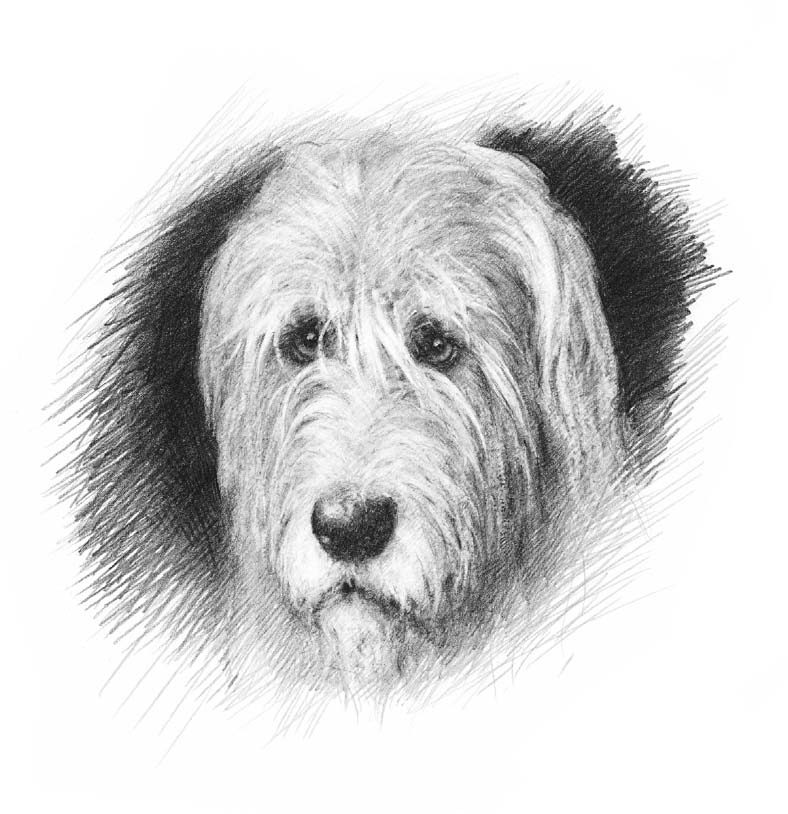
Contents
Cover
Title Page
Copyright
Dedication
Chapter 1
Chapter 2
Chapter 3
Chapter 4
Chapter 5
Chapter 6
Chapter 7
Chapter 8
Chapter 9
Chapter 10
Chapter 11
Chapter 12
Chapter 13
Chapter 14
Chapter 15
Chapter 16
Chapter 17
Chapter 18
Chapter 19
Chapter 20
Chapter 21
Chapter 22
Chapter 23
Chapter 24
Chapter 25
Chapter 26
Chapter 27
Chapter 28
Chapter 29
Chapter 30
Chapter 31
Chapter 32
Chapter 33
Chapter 34
Chapter 35
Chapter 36
Chapter 37
Chapter 38
Chapter 39
Chapter 40
Chapter 41
Chapter 42
Chapter 43
Chapter 44
Chapter 45
Acknowledgements
Keep Reading …
About the Author
Books by Sarah Lean
About the Publisher
MY NAME IS CALLY LOUISE FISHER AND I haven’t spoken for thirty-one days. Talking doesn’t always make things happen, however much you want it to. Think of rain; it just happens when it happens. When the clouds are ready, when they’re full, they drop the water. It’s not magic; it’s just putting something back where it belongs.
And this is how it all began.

1.
DAD’S BIRTHDAY, AND I GOT UP BEFORE ANYONE.
He just wanted a quiet day. No presents, no cake, no nothing. It just wouldn’t be right, he said. People forget birthdays aren’t just about them.
Dad’s birthday is also the same day my mum died last year. I think it’s called a tragedy or a catastrophe or some other big word which means more than just “bad luck” when two things like that happen on the same day.
I sat outside Dad’s bedroom door with his birthday cards, waiting. Through the gap in the doorway I could just make out the dark hump under the covers and his dark head making a deep dent in his pillow. He sighed, so I knew he was awake.
There were six birthday cards for Dad. One from me, one from my older brother Luke (still in bed or on his computer – the door was shut) and four that had come in the post. I nudged Dad’s bedroom door open a bit wider and flung my card in. I saw Dad patting round the bed, feeling for the blue envelope that landed by his back, and heard it crunch as he opened it. It was a picture of a grey bear with a blue nose. It was speaking on the telephone and on the front it said A Message From Me To You.
Dad said, “Thanks, that’s nice.”
And I said, “Are you thinking about Mum?”
Silence.
And then he said, “Get me a cup of coffee, will you?”
It didn’t feel like a birthday at all, not even with the cards on top of the telly. Dad had the volume turned low while we sat around waiting for the rest of our family to arrive and come with us to visit Mum’s grave for her anniversary.
2.
GRANDPA AND GRANDMA HAMBLIN PICKED US up and drove slowly to the cemetery. We met Granddad Fisher and Aunty Sue and walked together along paths of tidy grass and loving memories.
We made a circle, stood still as statues, not talking about her because Dad says it’s too hard to talk about her. We stared at the cold, grey stone marked with her name. Louise Fisher. The same as my middle name.
And I thought about her, up there, somewhere. Not here. And because she was so far away I missed her like crazy and I wondered if I should have had some breakfast because my belly hurt like mad.
And then there she was. I saw my mum. And I know what you’re thinking – you can’t really see dead people. But I did. She was standing on the wall of the cemetery, wearing her red raincoat and waxy green hat. And I wasn’t scared. Why would I be scared of my own mum?
She put her arms out to balance, swaying as she walked along the wall. Just like she always was, doing something that made you want to laugh or do it too. She wobbled along, until she was as close as she could get to us without jumping down. She pushed her hat flat on her head. She looked at me and smiled, just like she did when she saw me sing in the school musical of Charlotte’s Web. Like you’re everything.
Grandma had a bunch of sweet peas wrapped in silver foil.
“Be a good girl and put the flowers in the vase,” she said, holding them out. Her tissue fell out of her sleeve and floated to the ground.
“Do you believe in ghosts?” I whispered, picking up her tissue and handing it back. “Do you believe Mum could come back and we could see her?”
The purple and pink flowers reflected in her glasses and made them look like a church window. She closed her eyes and dabbed her nose.
“Oh, dear,” she said, “we’re all a little upset.” She sniffed the flowers and put them in my hand.
I made my way round the tight circle of bodies and squeezed between Aunty Sue and Dad.
“Do you believe in ghosts, Aunty Sue?” I said. “Have you ever seen Mum, even though she’s not supposed to be there?”
I guided her arm so that she would turn round and look over at the wall, so she could see Mum, colourful and bright and real as anything. I watched her eyes for the sudden surprise. Her mouth made the shape of a smile, but she frowned. I didn’t know what that meant.
“She’s there, Aunty Sue,” I whispered, pointing. “Over there.”
She blinked. Nothing.
“Dad,” I said, “look! Look over there on the wall. It’s Mum!”
He rubbed his beard. They both looked at me, in that way people do when they’re not really listening to what you’re saying. So did Grandma and Grandpa Hamblin and Granddad Fisher.
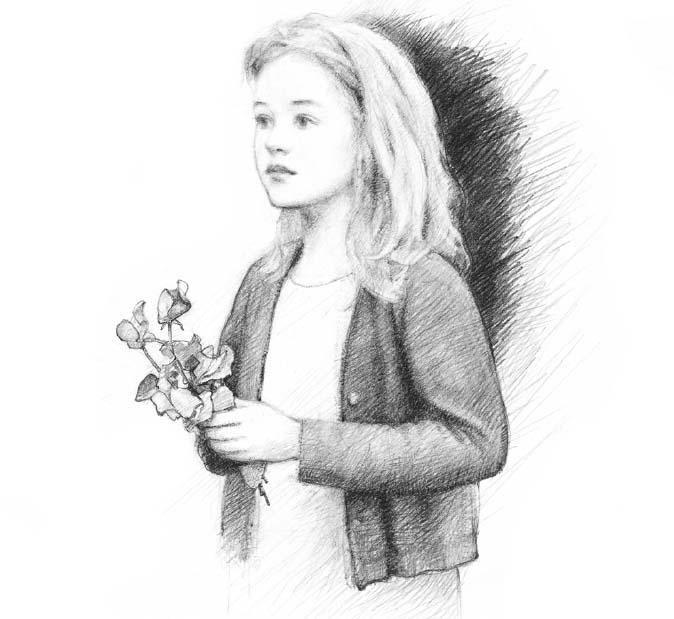
Granddad Fisher said, “Now, now, Cally, it’s neither the time nor place for silly games.”
Then Grandpa Hamblin looked at the sky, at the distant grey clouds. “Rain’s on its way,” he muttered.
Dad looked at the silent earth.
“Dad?” I said. “I can see her. I know she’s dead, but she’s here.”
And right then, when I looked across and Mum’s eyes shone as bright as a whole sky full of sunshine, I felt that her and me were the only ones truly alive. My heart thumped, my lungs filled and I wanted to shout, “Mum, sing a song, then they’ll hear you. Make the birds wonder, just like you used to.”
“Cally, love,” Aunty Sue said, “sometimes our imaginations play tricks on us.” She reached round and rested her hand on Dad’s shoulder. “Sometimes, when you really want to believe something, you can make it seem true.”
Tears smudged her mascara. Grandma blew into her tissue.
I thought I heard something, like when the carnival starts and you’re miles away down the other end of town, but you know it’s coming. Mum made a funnel of her hands, like a loudspeaker.
“Dad, she wants to tell us something,” I said.
I saw into his eyes before he looked away, like all the words waiting there were too big to pronounce, too hard to say properly. He hunched his shoulders, rubbed his face.
“Enough, Cally,” he said, “you’re upsetting people.”
I whispered, “Can’t you see her?”
She’d stopped smiling. She searched her pocket as if she was trying to find something. I wondered why she had a coat and hat on when it was such a warm summer day.
“Dad,” I pointed, “you can see her, can’t you?”
“No,” he growled, “and neither can you. And I don’t want to hear another word about it.”
3.
“GET INTO GROUPS OF TWO OR THREE. EACH group will represent a planet,” said Miss Steadman in science. “As it’s stopped raining, we’re going out to the playground to map out the solar system.”
I said to Mia Johnson, who was my best friend, “Let’s us two be Earth.”
Then Daisy Bouvier came over, chewing her nails. She hung around us like she’d been doing a lot lately since she fell out with Florence Green at a sleepover. Mia looked at me funny and said, “Daisy, you’re in my group too.”
Miss Steadman started talking about planets being millions of miles away and that we had to pretend the playground was the whole solar system. I nudged Mia and tried to whisper about what us two could do at break-time, not including Daisy. But I couldn’t tell her because Miss Steadman said, “Shush, Cally. Let’s try very hard today not to talk when I’m speaking. Otherwise you won’t learn anything.”
She marked our place with a blue chalk circle and set off to Mars with another group and some red chalk.
Doing space reminded me of the day when our family had gone to Wells. Inside the enormous yellow cathedral was one of the oldest clocks in the world. The earth was painted in the middle of the clock and the ancient sun circled round the outside on the long hand.
Mum had said, “Sometimes people get things the wrong way round.”
Because it was hundreds of years old, the people who painted it didn’t know what the universe was like. Now everyone knows we are the ones spinning on our tiny planet through space, circling round the sun. It’s funny how that happens and we can’t even feel it.
“Look,” I said to Mia and Daisy, “this is how our planet spins.”
With my arms out, I went round and round. It made my hands go heavy and my eyes go giddy.
“Stop it,” said Mia, “we’re supposed to be listening not talking and spinning.”
“You could be the moon,” I said to Daisy.
“Miss Steadman didn’t say to be a moon,” she said. “And I wanted to be Mercury.”
“But look,” I said, “look what would happen if we suddenly started spinning a different way.”
I bumped into the moon and that made me fly off in a different direction.
“Look,” I said, “we could go right out into space and see what’s there.”
“Cally Fisher!” Miss Steadman shouted across the galaxy. “Go back to your circle and stay there!”
But I wanted to see what was out there. I imagined a splash of light winking from across the universe. Maybe it was a star, maybe it was a doorway, a way through a hole in the sky where souls and angels go. And who wouldn’t want to find out what was shining in the darkness when it’s the only bright thing in the whole of space?
Anyway, I got sent to Pluto with Daniel Bird who didn’t have a partner.
“You’re in trouble again,” he said, because he is always stating the obvious.
4.
WE HAD MUSIC NEXT WITH MR CRISP. I LOVE singing. I get that from my mum. She could sing and Dad would say the early morning birds ought to think about getting another job. Mum said singing is like knitting: it ties everything together, especially people. That’s why Dad played the guitar for her and why he played in a band down at the pub on Friday nights. Well, he used to.
So when Mr Crisp said we were doing a farewell concert at the end of term, me and Mia said we’d put our names down for the auditions to sing together, seeing as it was our last year at Parkside Juniors.
Then, after music, I heard Daisy talking to Mia in the loos.
Daisy said, “Let’s just put our names down to do something on our own. We’ll just not tell her.”
Mia said, “We could do a duet, seeing as we’re best friends now.”
They talked about some songs they liked.
“She’d only drown us out anyway,” said Daisy.
They laughed and Mia said, “Actually, I think she’s a rubbish singer.”
Then they came round the corner of the cubicles and Mia slammed, smack! right into me in the doorway.
“I’m not rubbish,” I said.
Her eyes flashed. “I never said that.”
“I heard you.”
Mia went red. She punched her hands on her hips. “I was only joking,” she said.
“She can’t take a joke,” said Daisy.
“And anyway, every time we do something with you, you always get told off. And you’re always making such a big fuss about everything.”
“No, I don’t,” I said.
“Yes, you do!” said Mia.
“No, I don’t! And you’re supposed to be my friend.”
“See, you’re doing it now. You just spoil everything. And I never said for definite I was going to do it with you.”
“You’re not a very good friend. Good friends wouldn’t say things like that.”
“Well, if that’s how you feel,” said Mia, hooking Daisy’s arm and marching down the corridor, “we don’t have to be friends any more.”
I stayed in the loo with the door locked, peeling bits of plastic off the scabby patch by the loo roll until the bell rang.
I could still put my name down for the concert. Only now I’d have to sing on my own.
Конец ознакомительного фрагмента.
Текст предоставлен ООО «ЛитРес».
Прочитайте эту книгу целиком, купив полную легальную версию на ЛитРес.
Безопасно оплатить книгу можно банковской картой Visa, MasterCard, Maestro, со счета мобильного телефона, с платежного терминала, в салоне МТС или Связной, через PayPal, WebMoney, Яндекс.Деньги, QIWI Кошелек, бонусными картами или другим удобным Вам способом.


